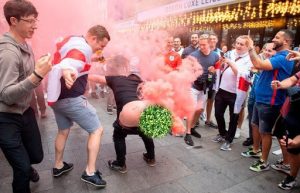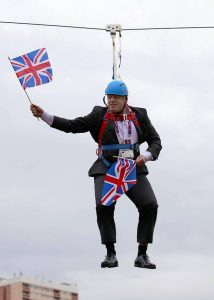Emigration has long been a sore spot for the Irish. A favourite lame excuse was the one the late Brian Lenihan came up with in the 1980s: “Sure isn’t it a small island? We can’t all live on it.”
My own moment of shame from that era happened when I was returning from Italy to Ireland for Christmas 1980. I had to pass through London and on the Underground between Gatwick and Euston a grizzled, freckled, oul’ fella with a nearly empty bottle of whiskey came up to me:
“Yer Irish, arnchya? Have a dhrink.”
“No, no, no. You’re mistaken. I’m not Irish at all.”
Peter denying Christ can’t have felt guiltier. Though maybe responding:
“Yes, yes, I am Irish but I don’t want any of your whiskey. That bottle looks dirty” might not have been sensible.
Since then we’ve got much more comfortable with our emigrants and their descendants, celebrating our cousins the Irish-Americans, Irish-Canadians, Irish-Australians, Irish-Argentinians, even British-Irish. But there’s one step we still can’t take, any more than I could on that Tube train in 1980.

“English-Irish” still sounds impossible, a logical contradiction, like describing a colour as “Black-White”, even though over the past four centuries more Irish have migrated to England than to any other destination.
A major reason is that we’re far closer than we like to admit, and not just geographically. For more than 1000 years, we’ve been marrying them and fighting them and fighting for them and writing masterpieces in their language. In return, they’ve been marrying us, stealing our land and, above all, misunderstanding us.

But they are our cousins. One thing that 1980s teaching stint in Italy showed me was the extraordinary cultural overlap between the English and the Irish. We understood their sense of humour, their politics, their accents, their class problems (though they still didn’t understand us, which we kind of liked). They were (are) almost us.
What sparked these thoughts was my growing realisation of the importance of English records for Irish research. Now that those records are easily searchable online, it’s becoming clearer and clearer that they hold solutions to many of the gaps created by the gaping holes left by the destruction of the Public Record Office in 1922. Quite simply our extended families were there and are listed.
Finding them in English records is another thing. I’ve just put up a video that dips a toe in their censuses. Enjoy.
As a Canadian who has lived most of my life in the United States, I alway rankle (to put it lightly) when an American suggests that Canada is no different than the US. Just try saying that north of the border. Canadians just love to not be Americans, and that in itself is part of the Canadian identity. We actually like being misunderstood, because it maintains the degree of separateness that helps us be, well, separate. I thoroughly enjoy your blogs, keep them up.
Dear John,
I love the fact that you seldom send emails, so when you do…..I always read them right away! In terms of English records, I had several Irish Catholic ancestors who lived in England, circa 1850-1870 and also 1880-1910. I believe it likely they were in Lancashire. I have never been able to find any baptism records for their many children or their marriage records. They were Catholic, I am sure, but I find nothing. I have checked Church of England also. I am wondering if you have any advice? Thanks, Peggy Baker
Hello Peggy.
Don’t give up. It may have taken a long while but I did find my Cork based Martin/Cronin line in London on the 1861 and 1871 census records. My great grandparents marriage c1869, and the birth record of my grandmother c1874. Through trial and error, and may deductions on possibilities, I also found the death records of 4 out o 6 of them (a very sad discovery, dam TB.)
Karen Waldron
This reminds me of the 2007 Irish language film Kings, based on Jimmy Murphy’s play, The Kings of Kilburn High Road, about Irish immigration to North London in the seventies. I saw it at a film festival, where it had subtitles. I haven’t been able to find it subtitled online, but it is very powerful, and has stayed with me all these years.
The problem you mention of the reluctance to acknowledge any connection between the English and the Irish only exists inside the island of Ireland. People such as myself who have two Irish grandmothers who were both very happily married to my two English grandfathers are proud of our Irish/English heritage and have no problem acknowledging and embracing it. However, had both of my Irish grandmothers not emigrated out of Ireland it might have been a different story, and undoubtedly I would not have been here to tell the tale!
And your Irish-New Zealand cousins
GERALDENE
I found my Irish great-great-great grandfather in the 1851 Census when he was living in Manchester. Fortunately it listed him as a Chelsea Pensioner and I was able to get his Army papers, showing he took the King’s shilling in 1826. The only details I have of his life in Ireland are on those papers.
Love this story, John.
My understanding is that Boris is a 14th ? cousin of Elizabeth II, as was David Cameron. It’s Who you know…..haha.
When one set of my grandparents married, he from London and Church of England, and she of English/Irish Catholicism, they chose to raise any sons as C of E and daughters, Catholic like their mother. Caused problems they didn’t foresee… Daisy could not see her brothers married in C of E church etc. But, it tells us something of their respect of each other’s differences.
The family tree…… Fascination galore.
Carolyn in The Land Down Under
When Brittania ruled, I can see her taking whatever she wanted, just because she could. But now, hanging on to any part of Ireland just makes her look like an old bully. Wouldn’t it make more sense to be a good neighbor.
Yes, English American with Irish grandmother.
David Cameron is a much closer relative than 14th cousin, since he’s descended from one of the natural children of William IV.